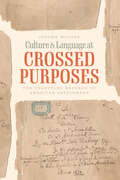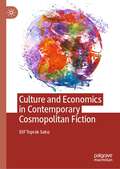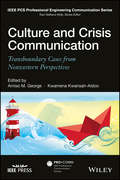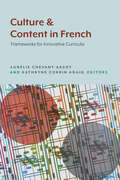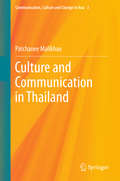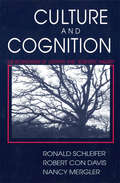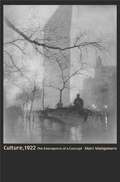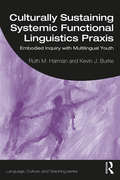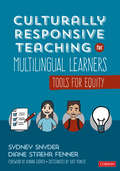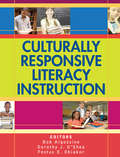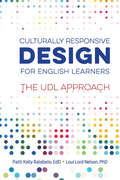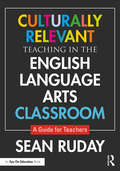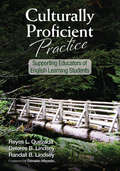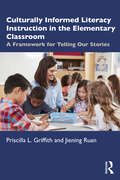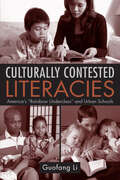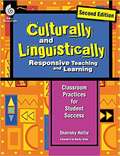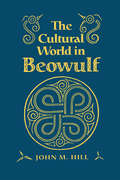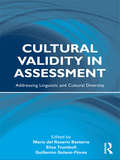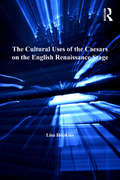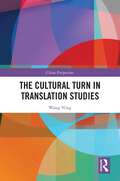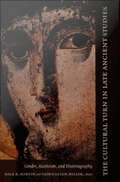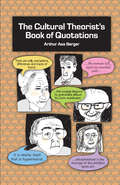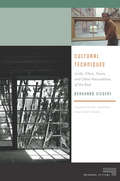- Table View
- List View
Culture and Language at Crossed Purposes: The Unsettled Records of American Settlement
by Jerome McGannCulture and Language at Crossed Purposes unpacks the interpretive problems of colonial treaty-making and uses them to illuminate canonical works from the period. Classic American literature, Jerome McGann argues, is haunted by the betrayal of seventeenth- and eighteenth-century Indian treaties—“a stunned memory preserved in the negative spaces of the treaty records.” A noted scholar of the “textual conditions” of literature, McGann investigates canonical works from the colonial period, including the Arbella sermon and key writings of William Bradford, John Winthrop, Anne Bradstreet, Cotton Mather’s Magnalia, Benjamin Franklin’s celebrated treaty folios and Autobiography, and Thomas Jefferson’s Notes on the State of Virginia. These are highly practical, purpose-driven works—the record of Enlightenment dreams put to the severe test of dangerous conditions. McGann suggests that the treaty-makers never doubted the unsettled character of what they were prosecuting, and a similar conflicted ethos pervades these works. Like the treaty records, they deliberately test themselves against stringent measures of truth and accomplishment and show a distinctive consciousness of their limits and failures. McGann’s book is ultimately a reminder of the public importance of truth and memory—the vocational commitments of humanist scholars and educators.
Culture and Economics in Contemporary Cosmopolitan Fiction
by Elif Toprak SakızThis book investigates how culture and economics define novel forms of cosmopolitanism and cosmopolitan fiction. Tracing cosmopolitanism’s transition from universalism to vernacularism, the book opens up new avenues for reading cosmopolitan fiction by offering a precise and convenient set of terminology. The figure of the cosmoflâneur identifies a contemporary cosmopolitan character’s urban mobility and wandering consciousness in interaction with the global and the local. Posthuman cosmopolitanism also extends the meaning of cosmopolitan which comes to embrace the nonhuman alongside the human element. Defining narrative glocality, political hyper-awareness, and narrative immediacy, the book thoroughly explores how cosmopolitan narration forges direct responses to the contemporary world in postmillennial cosmopolitan novels. All of these concepts are elaborated in Ian McEwan’s Saturday (2005), Zadie Smith’s NW (2012), Salman Rushdie’s The Golden House (2017), and Kazuo Ishiguro’s Klara and the Sun (2021), to which world-engagement is central.
Culture and Crisis Communication: Transboundary Cases from Nonwestern Perspectives
by Amiso M. George Kwamena Kwansah-AidooA collection of case studies from nonwestern countries that offers an analysis of the significant role culture plays in crisis communication Culture and Crisis Communication presents an examination of how politics, culture, religion, and other social issues affect crisis communication and management in nonwestern countries. From intense human tragedy to the follies of the rich, the chapters examine how companies, organizations, news outlets, health organizations, technical experts, politicians, and local communities communicate in crisis situations. Taking a wider view than a single country’s perspective, the text contains a cross-cultural and cross-country approach. In addition, the case studies offer valuable lessons that organizations that wish to operate or are operating in those cultures can adopt in preparing and managing crises. The book highlights recent crisis events such as Syria’s civil war, missing Malaysia Flight MH370, andJapan’s Fukushima Daiichi nuclear power plant disaster. Each of the case studies examines how culture impacts communication and responses to crises. Authoritative, insightful, and instructive, this important resource: Analyzes how nonwestern cultures respond to crises Covers the role of culture in crisis communication in recent news events Includes contributions from 18 international authors who provide insight on nonwestern culture and crisis communication Written for communication professionals, academics, and students, Culture and Crisis Communication presents an insightful introduction to the topic of culture and crisis communication and then delves into illustrative case studies that explore intra-cultural and trans-boundary crisis communication.
Culture and Content in French: Frameworks for Innovative Curricula
by Aurélie Chevant-AksoyInstructors in today’s language classrooms face the challenge of preparing globally competent and socially responsible students with transcultural aptitude. As classroom content shifts toward communication, collaboration, and problem solving across cultural, racial, and linguistic boundaries, the teaching of culture is an integral part of foreign language education. This volume offers nontraditional approaches to teaching culture in a complex time when the internet and social networks have blurred geographical, social, and political borders.The authors offer practical advice about teaching culture with kinesthetics, music, improvisation, and communication technologies for different competency levels.The chapters also explore multi-literacies, project-based learning, and discussions on teaching culture through literature, media, and film.The appendices share examples of course syllabi, specific course activities, and extracurricular projects that explore culinary practices, performing arts, pop culture, geolocation, digital literacy, journalism, and civic literacy.
Culture and Communication in Thailand (Communication, Culture and Change in Asia #3)
by Patchanee MalikhaoThis book features research papers that examine a host of contemporary issues in Thailand. Coverage includes culture, gender violence, tourism, human trafficking, environmental and ecological issues, sustainability and the sufficiency economy, the (mis)handling of elephants, and more. It features a sociological and anthropological perspective with a dash of communication for sustainable social change. The papers investigate the various phases of communication technology and its impact on cultural change in the country. They explore the use of social networks and privacy issues as well as ethical journalism in the contexts of Thai Buddhism, Thai culture, and other enabling environmental factors. The contributors focus on documentary research of both quantitative and qualitative data on Thai social change as a consequence of globalization and digital technology. They first provide a general overview of social media and communication in the country. Next, the authors go on to explore the specifics of digital communication. This includes a look at its impact on the various ways of Thai communication given politico-economic and religious influences.
Culture and Commerce in Conrad's Asian Fiction
by Andrew FrancisAndrew Francis' Culture and Commerce in Conrad's Asian Fiction is the first book-length critical study of commerce in Conrad's work. It reveals not only the complex connections between culture and commerce in Conrad's Asian fiction, but also how he employed commerce in characterization, moral contexts, and his depiction of relations at a point of advanced European imperialism. Conrad's treatment of commerce - Arab, Chinese and Malay, as well as European - is explored within a historically specific context as intricate and resistant to traditional readings of commerce as simple and homogeneous. Through the analysis of both literary and non-literary sources, this book examines capitalism, colonialism and globalization within the commercial, political and social contexts of colonial Southeast Asia.
Culture and Cognition: The Boundaries of Literary and Scientific Inquiry
by Ronald Schleifer Robert Con Davis Nancy MerglerThis groundbreaking book challenges the disciplinary boundaries that have traditionally separated scientific inquiry from literary inquiry. It explores scientific knowledge in three subject areas—the natural history of aging, literary narrative, and psychoanalysis. In the authors' view, the different perspectives on cognition afforded by Anglo-American cognitive science, Greimassian semiotics, and Lacanian psychoanalysis help us to redefine our very notion of culture.Part I historically situates the concepts of meaning and truth in twentieth-century semiotic theory and cognitive science. Part II contrasts the modes of Freudian case history to the general instance of Einstein's relativity theory and then sets forth a rhetoric of narrative based on the discourse of the aged. Part III examines in the context of literary studies an interdisciplinary concept of cultural cognition.Culture and Cognition will be essential reading for literary theorists, historians and philosophers of science; semioticians; and scholars and students of cultural studies, the sociology of literature, and science and literature.
Culture, 1922: The Emergence of a Concept
by Marc ManganaroCulture, 1922 traces the intellectual and institutional deployment of the culture concept in England and America in the first half of the twentieth century. With primary attention to how models of culture are created, elaborated upon, transformed, resisted, and ignored, Marc Manganaro works across disciplinary lines to embrace literary, literary critical, and anthropological writing. Tracing two traditions of thinking about culture, as elite products and pursuits and as common and shared systems of values, Manganaro argues that these modernist formulations are not mutually exclusive and have indeed intermingled in complex and interesting ways throughout the development of literary studies and anthropology. Beginning with the important Victorian architects of culture--Matthew Arnold and Edward Tylor--the book follows a number of main figures, schools, and movements up to 1950 such as anthropologist Franz Boas, his disciples Edward Sapir, Ruth Benedict, and Zora Neale Hurston, literary modernists T. S. Eliot and James Joyce, functional anthropologist Bronislaw Malinowski, modernist literary critic I. A. Richards, the New Critics, and Kenneth Burke. The main focus here, however, is upon three works published in 1922, the watershed year of Modernism--Eliot's The Waste Land, Malinowski's Argonauts of the Western Pacific, and Joyce's Ulysses. Manganaro reads these masterworks and the history of their reception as efforts toward defining culture. This is a wide-ranging and ambitious study about an ambiguous and complex concept as it moves within and between disciplines.
Culturally Sustaining Systemic Functional Linguistics Praxis: Embodied Inquiry with Multilingual Youth (Language, Culture, and Teaching Series)
by Kevin J. Burke Ruth M. HarmanBy introducing a framework for culturally sustaining Systemic Functional Linguistics (SFL) praxis, Harman, Burke and other contributing authors guide readers through a practical and analytic exploration of youth participatory work in classroom and community settings. Applying an SFL lens to critical literacy and schooling, this book articulates a vision for youth learning and civic engagement that focuses on the power of performance, spatial learning, community activism and student agency. The book offers a range of research-driven, multimodal resources and methods for teachers to encourage students’ meaning-making. The authors share how teachers and community activists can interact and support diverse and multilingual youth, fostering a dynamic environment that deepens inquiry of the arts and disciplinary area of knowledge. Research in this book provides a model for collaborative engagement and community partnerships, featuring the voices of students and teachers to highlight the importance of agency and action research in supporting literacy learning and transformative inquiry. Demonstrating theoretically and practically how SFL praxis can be applied broadly and deeply in the field, this book is suitable for preservice teachers, teacher educators, graduate students and scholars in bilingual and multilingual education, literacy education and language policy.
Culturally Responsive Teaching for Multilingual Learners: Tools for Equity
by Diane Staehr Fenner Sydney Cail SnyderWhat will you do to promote multilingual learners’ equity? Our nation’s moment of reckoning with the deficit view of multilingual learners has arrived. The COVID-19 pandemic has further exposed and exacerbated long-standing inequities that stand in the way of MLs’ access to effective instruction. Recent events have also caused us to reflect on our place as educators within the intersection of race and language. In this innovative book, Sydney Snyder and Diane Staehr Fenner share practical, replicable ways you can draw from students’ strengths and promote multilingual learners′ success within and beyond your own classroom walls. In this book you’ll find • Practical and printable, research-based tools that guide you on how to implement culturally responsive teaching in your context • Case studies and reflection exercises to help identify implicit bias in your work and mitigate deficit-based thinking • Authentic classroom video clips in each chapter to show you what culturally responsive teaching actually looks like in practice • Hand-drawn sketch note graphics that spotlight key concepts, reinforce central themes, and engage you with eye-catching and memorable illustrations There is no time like the present for you to reflect on your role in culturally responsive teaching and use new tools to build an even stronger school community that is inclusive of MLs. No matter your role or where you are in your journey, you can confront injustice by taking action steps to develop a climate in which all students’ backgrounds, experiences, and cultures are honored and educators, families, and communities work collaboratively to help MLs thrive. We owe it to our students.
Culturally Responsive Teaching for Multilingual Learners: Tools for Equity
by Diane Staehr Fenner Sydney Cail SnyderWhat will you do to promote multilingual learners’ equity? Our nation’s moment of reckoning with the deficit view of multilingual learners has arrived. The COVID-19 pandemic has further exposed and exacerbated long-standing inequities that stand in the way of MLs’ access to effective instruction. Recent events have also caused us to reflect on our place as educators within the intersection of race and language. In this innovative book, Sydney Snyder and Diane Staehr Fenner share practical, replicable ways you can draw from students’ strengths and promote multilingual learners′ success within and beyond your own classroom walls. In this book you’ll find • Practical and printable, research-based tools that guide you on how to implement culturally responsive teaching in your context • Case studies and reflection exercises to help identify implicit bias in your work and mitigate deficit-based thinking • Authentic classroom video clips in each chapter to show you what culturally responsive teaching actually looks like in practice • Hand-drawn sketch note graphics that spotlight key concepts, reinforce central themes, and engage you with eye-catching and memorable illustrations There is no time like the present for you to reflect on your role in culturally responsive teaching and use new tools to build an even stronger school community that is inclusive of MLs. No matter your role or where you are in your journey, you can confront injustice by taking action steps to develop a climate in which all students’ backgrounds, experiences, and cultures are honored and educators, families, and communities work collaboratively to help MLs thrive. We owe it to our students.
Culturally Responsive Literacy Instruction
by Bob Algozzine Dorothy J O'Shea Dr Festus E. ObiakorImprove reading achievement for students from diverse backgrounds with research-supported practices and culturally responsive interventions in phonemic awareness, phonics/decoding, fluency, vocabulary, and comprehension.
Culturally Responsive Design for English Learners: The UDL Approach
by Patti Kelly Ralabate Loui Lord NelsonThe cultural and linguistic diversity of students is on the rise, and educators want to know the most effective ways to teach English language learners (ELLs). Two research-based frameworks—Universal Design for Learning (UDL), which addresses the innate brain-based differences of learners, and Culturally Responsive Teaching (CRT), a pedagogy that responds to learners' cultural differences—can help. In this important new book, UDL experts and bestselling authors Patti Kelly Ralabate and Loui Lord Nelson offer a unique lesson planning process that blends UDL and CRT so that educators can proactively meet the learning needs of ELLs. This essential new resource offers scenarios, summaries, reflection questions, and classroom-based exercises to support responsive instruction. Learn to design and craft goals, methods, materials, and assessments that help ELLs optimize their educational experience.
Culturally Relevant Teaching in the English Language Arts Classroom: A Guide for Teachers
by Sean RudayThis book is a practical, research-based, classroom-ready resource for English language arts teachers interested in learning how to incorporate culturally relevant pedagogy into all aspects of their instruction, including writing, reading, and vocabulary lessons. It also provides suggestions for building an inclusive classroom environment in which all students’ backgrounds are valued. Topics covered: Writing strategies and diverse texts Dialect and student writing Applying reading strategies to texts that represent diverse backgrounds Using reading strategies in out-of-school contexts Considering students’ funds of knowledge and language awareness Connecting linguistic diversity to word-root instruction Building an inclusive classroom environment The appendix features several useful tools, including a study guide, a comprehensive list of suggested texts, recommendations for parent communication, and reproducible tools for the classroom. The study guide and reproducibles are available for free download from our website at www.routledge.com/9781138393318.
Culturally Proficient Practice: Supporting Educators of English Learning Students
by Reyes L. Quezada Delores B. Lindsey Randall B. LindseyHelp your English learning students achieve academic success! Designed to empower educators to become agents of change in their classrooms, schools, and communities, this guide introduces the principles of Cultural Proficiency and how they can help improve educators’ ability to effectively teach English language learners. This book features: <p><p> Activities that build core Cultural Proficiency skills and promote personal transformation <p> A chapter-by-chapter rubric for working effectively with English learning students <p> A conversation-starting case story featuring the River View School District <p> Strategies for using action research to improve the success of English learning students
Culturally Informed Literacy Instruction in the Elementary Classroom: A Framework for Telling Our Stories
by Priscilla L. Griffith Jiening RuanThis text introduces an original, scalable instructional framework called Telling Our Stories (TOS), an approach for supporting culturally informed literacy instruction in the elementary classroom. Connecting the theory to practice, the TOS framework centers the cultural heritage and experiences of students and offers a roadmap to scientifically and pedagogically sound instruction. Aligned with current curriculum standards, chapters feature authentic examples and case studies, reflection questions, and writing activities that will foster a culture of inclusion, community, and academic rigor. The many practical strategies promote students’ learning and appreciation of diversity through academic reading and writing as well as positive school-family and school-community relations. Readers will come away with new ideas, tools, and a thorough understanding of how to integrate culturally informed practices in ways that support the learning of all children. Accessible and comprehensive, this is an essential text for pre-service teachers in courses on ELA methods and literacy instruction, as well as practicing teachers.
Culturally Contested Literacies: America's "Rainbow Underclass" and Urban Schools
by Guofang LiCulturally Contested Literacies is a vivid ethnographic account of the everyday cross-cultural living and schooling experiences of six culturally-diverse families in urban America. Documenting the ways in which these families learn about literacies and their meanings in relation to schools, inner city environments, and other ethnic groups, Guofang Li's incisive analysis reveals the unique experiences of fractured urban America. Unlike prior research that fragments various social categories, Culturally Contested Literacies explores the rich complexity within each family as they make sense of their daily relations in terms of race, ethnicity, class, and gender. It then juxtaposes the productions of such familial relations across and within cultural groups with the context of the larger socio-political and socio-economic formations. By presenting a realistic picture of the varying ways that America’s "rainbow underclass" might encounter schooling, Li argues that urban education must be understood in relation to not only the individual’s cultural and familial milieu, but also to the interactive context between the individual and schools.
Culturally And Linguistically: Classroom Practices For Student Success (Culturally And Linguistically Responsive Teaching And Learning)
by Sharroky HollieCulturally and Linguistically Responsive Teaching and Learning is a strategy audio guide designed to help teachers learn key strategies to approach their teaching through a culturally and linguistically responsive lens; embracing and placing value on students' culture and language, allowing them to thrive in the classroom. Narrated by Dr. Sharroky Hollie, this educational resource helps teachers stay up-to-date with current research, best practices, and evidence-based teaching strategies. It provides novice and experienced educators with a pedagogical framework for implementing culturally and linguistically responsive strategies in today's diverse classrooms; addresses culture and language in five key areas: classroom management, academic literacy, academic vocabulary, academic language, and learning environment. PDF resources of the appendices from the print version are included. An ideal resource for teachers either through the school year or during the summer, but also useful for homeschooling parents looking to meet the demands of today’s educational curriculum.
Cultural World in Beowulf
by John M HillBeowulf is one of the most important poems in Old English and the first major poem in European vernacular language. It dramatizes behavior in a complex social world--a martial, aristocratic world that we often distort by imposing on it our own biases and values. In this cross-disciplinary study, John Hill looks at Beowulf from a comparative ethnological point of view. He provides a thorough examination of the socio-cultural dimensions of the text and compares the social milieu of Beowulf to that of similarly organized cultures. Through examination of historical analogs in northern Europe and France, as well as past and present societies on the Pacific rim in Southeast Asia, a complex and extended society is uncovered and an astonishingly different Beowulf is illuminated.The study is divided into five major essays: on ethnology and social drama, the temporal world, the legal world, the economy of honour, and the psychological world. Hill presents a realm where genealogies incorporate social and political statements: in this world gift giving has subtle and manipulative dimensions, both violent and peaceful exchange form a political economy, acts of revenge can be baleful or have jural force, and kinship is as much a constructible fact as a natural one. Family and kinship relations, revenge themes, heroic poetry, myth, legality, and political discussions all bring the importance of the social institutions in Beowulf to the foreground, allowing for a fuller understanding of the poems and its implications for Anglo-Saxon society.
Cultural Validity in Assessment: Addressing Linguistic and Cultural Diversity
by María Del Basterra Elise Trumbull Guillermo Solano-FloresWhat is assessment and how is it a cultural practice? How does failure to account for linguistic and cultural variation among students jeopardize assessment validity? What is required to achieve cultural validity in assessment? This resource for practicing and prospective teachers – as well as others concerned with fair and valid assessment – provides a thorough grounding in relevant theory, research, and practice. The book lays out criteria for culturally valid assessment and recommends specific strategies that teachers can use to design and implement culturally valid classroom assessments. Assessment plays a powerful role in the process of education in the US and has a disproportionately negative impact on students who do not come from mainstream, middle-class backgrounds. Given the significance of testing in education today, cultural validity in assessment is an urgent issue facing educators. This book is essential reading for addressing this important, relevant topic.
The Cultural Uses of the Caesars on the English Renaissance Stage (Studies in Performance and Early Modern Drama)
by Lisa HopkinsCaesarian power was a crucial context in the Renaissance, as rulers in Europe, Russia and Turkey all sought to appropriate Caesarian imagery and authority, but it has been surprisingly little explored in scholarship. In this study Lisa Hopkins explores the way in which the stories of the Caesars, and of the Julio-Claudians in particular, can be used to figure the stories of English rulers on the Renaissance stage. Analyzing plays by Shakespeare and a number of other playwrights of the period, she demonstrates how early modern English dramatists, using Roman modes of literary representation as cover, commented on the issues of the day and critiqued contemporary monarchs.
The Cultural Turn in Translation Studies (China Perspectives)
by Wang NingApplying the latest Western translation theories to the situation in China, this book redefines translation from an interdisciplinary and intercultural perspective, bringing intercultural semiotic translation into the sight of translation researchers. The book systematically expounds on the cultural turn in translation studies, and contributes to the escape of translation studies from the "cage of language". It focuses on discussing the deconstructive, post-modernist, and cultural translation theories that have motivated and promoted the cultural turn, especially Benjamin’s translation theory, Derrida’s deconstructive view of translation, and post-colonial translation theory. It also discusses in detail the theories of major international translation theorists, including Hillis Miller, Wolfgang Iser, Edward Said, Gayatri Spivak, Homi Bhabha, André Lefevere, Susan Bassnett, and Lawrence Venuti. These theories are mostly based on examples from Western or English-language texts, leaving a wide gap in the discourse of the field. This book seeks to fill that gap. For example, intercultural semiotic translation is defined and explained through the successful experiences of the Chinese translator Fu Lei. The role of translation during the Chinese revolution and the relocation of Chinese culture in the global cultural landscape through translation are also discussed. This book will be an essential read to students and scholars of translation studies and Chinese studies. It will also be a useful resource for translators and researchers of comparative literature and cultural studies.
The Cultural Turn in Late Ancient Studies: Gender, Asceticism, and Historiography
by Dale B. Martin Patricia Cox MillerThe essays in this provocative collection exemplify the innovations that have characterized the relatively new field of late ancient studies. Focused on civilizations clustered mainly around the Mediterranean and covering the period between roughly 100 and 700 CE, scholars in this field have brought history and cultural studies to bear on theology and religious studies. They have adopted the methods of the social sciences and humanities--particularly those of sociology, cultural anthropology, and literary criticism. By emphasizing cultural and social history and considerations of gender and sexuality, scholars of late antiquity have revealed the late ancient world as far more varied than had previously been imagined. The contributors investigate three key concerns of late ancient studies: gender, asceticism, and historiography. They consider Macrina's scar, Mary's voice, and the harlot's body as well as Augustine, Jovinian, Gregory of Nazianzus, Julian, and Ephrem the Syrian. Whether examining how animal bodies figured as a means for understanding human passion and sexuality in the monastic communities of Egypt and Palestine or meditating on the almost modern epistemological crisis faced by Theodoret in attempting to overcome the barriers between the self and the wider world, these essays highlight emerging theoretical and critical developments in the field. Contributors. Daniel Boyarin, David Brakke, Virginia Burrus, Averil Cameron, Susanna Elm, James E. Goehring, Susan Ashbrook Harvey, David G. Hunter, Blake Leyerle, Dale B. Martin, Patricia Cox Miller, Philip Rousseau, Teresa M. Shaw, Maureen A. Tilley, Dennis E. Trout, Mark Vessey
The Cultural Theorist's Book of Quotations
by Arthur Asa BergerWhere did you see it—that perfect quotation from Foucault or Kristeva to use in your upcoming keynote address? Stop the search and pick up Arthur Berger’s handy book of over 300 concise quotations from the vast literature in cultural theory. This compilation will give you just the right snappy quote to help prepare that lecture, write that paper, fill that Power Point, or drop a few bon mots at a university reception. Organized by theoretical model (semiotic, Marxist, psychoanalytic, gender, postmodernist), Berger pulls together the most succinct, meaningful passages of the key theorists of our time for those wanting to distill cultural theory to its essence.
Cultural Techniques: Grids, Filters, Doors, and Other Articulations of the Real
by Geoffrey Winthrop-Young Bernhard SiegertIn a crucial shift within posthumanistic media studies, Bernhard Siegert dissolves the concept of media into a network of operations that reproduce, displace, process, and reflect the distinctions fundamental for a given culture. Cultural Techniques aims to forget our traditional understanding of media so as to redefine the concept through something more fundamental than the empiricist study of a medium’s individual or collective uses or of its cultural semantics or aesthetics. Rather, Siegert seeks to relocate media and culture on a level where the distinctions between object and performance, matter and form, human and nonhuman, sign and channel, the symbolic and the real are still in the process of becoming. The result is to turn ontology into a domain of all that is meant in German by the word Kultur. Cultural techniques comprise not only self-referential symbolic practices like reading, writing, counting, or image-making. The analysis of artifacts as cultural techniques emphasizes their ontological status as “in-betweens,” shifting from firstorder to second-order techniques, from the technical to the artistic, from object to sign, from the natural to the cultural, from the operational to the representational. Cultural Techniques ranges from seafaring, drafting, and eating to the production of the sign-signaldistinction in old and new media, to the reproduction of anthropological difference, to the study of trompe-l’oeils, grids, registers, and doors. Throughout, Siegert addresses fundamental questions of how ontological distinctions can be replaced by chains of operations that process those alleged ontological distinctions within the ontic. Grounding posthumanist theory both historically and technically, this book opens up a crucial dialogue between new German media theory and American postcybernetic discourses.
